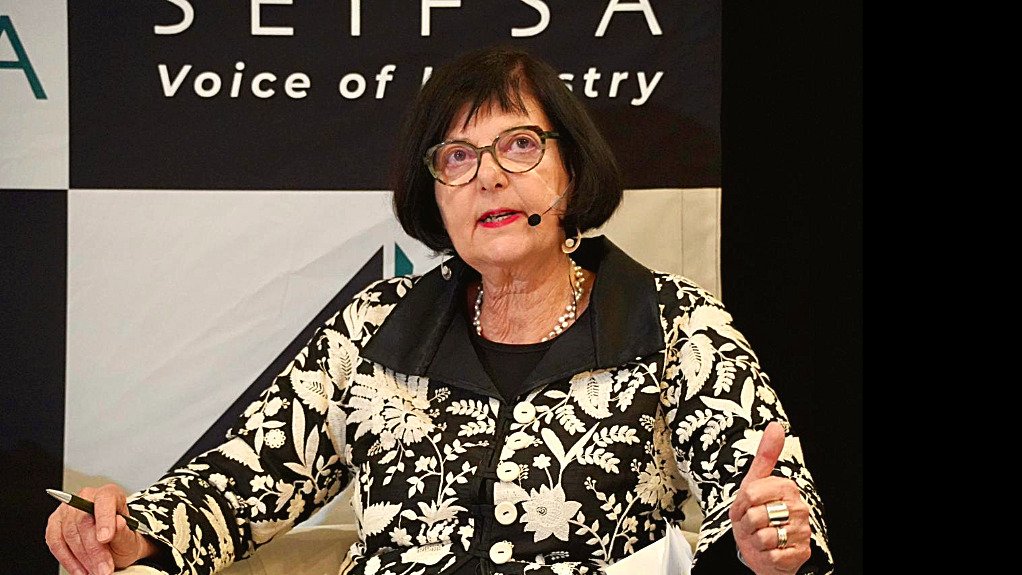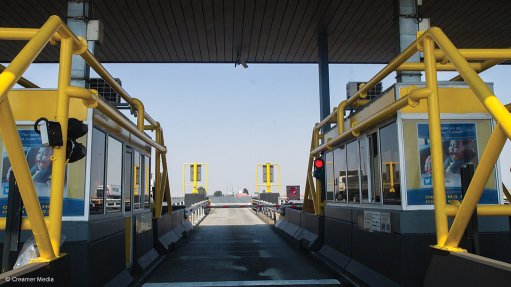Creecy sets year-end deadline for rail Network Statement amid ‘complicated tariff balancing act’


Transport Minister Barbara Creecy addressing a Steel and Engineering Industries Federation of Southern Africa conference in Ekurhuleni
Transport Minister Barbara Creecy says that, despite Transnet’s turnaround progress, the State-owned enterprise is not able to meet the target of increasing South Africa’s yearly rail volumes to 250-million tons alone.
The Government of National Unity is, therefore, prioritising efforts to open the network to third-party operators and private infrastructure investment in line with its “apex” goal of facilitating rapid economic growth.
Addressing a Steel and Engineering Industries Federation of Southern Africa (Seifsa) conference in Ekurhuleni, Creecy revealed that she had set a year-end deadline for the publication of a final Network Statement that was attractive to private operators, but still met the revenue needs of Transnet.
Making no reference to earlier commitments that the statement would be published by September, Creecy said only that finalising the document was “quite a complicated balancing act”.
A draft Network Statement was published by the Transnet Freight Rail Infrastructure Manager earlier this year ahead of public hearings held by the Interim Rail Economic Regulator Capacity, where the high tariffs implied when using the proposed methodology were heavily criticised by stakeholders.
“What we understand when we interrogate the tariff is that the tariff has to be attractive to third-party players.
“It also has to assist Transnet with its revenue-raising requirements, and so we are engaged in quite a complicated balancing act,” Creecy told delegates.
She highlighted progress being made by Transnet to improve rail volumes and port efficiency, but acknowledged that its recovery target for 2024/25 of below 200-million tons was not what industry, especially the mining industry, needed to grow.
“So what we've been saying is that Transnet is not going to be able, in the current conditions, to recover on its own and we need an industry-wide collaboration in order that we can take forward the recovery.”
PRIVATE SECTOR PARTICIPATION UNIT
The Department of Transport was also working on setting up a Private Sector Participation (PSP) framework for investments into the port and rail networks and would be setting up a PSP Unit to help ensure that projects could be progressed to financial close.
Creecy indicated that the unit would be housed in the Development Bank of Southern Africa and would seek to draw lessons from reforms in the electricity sector, where independent power producers have invested billions into new generation.
Deputy Finance Minister Dr David Masondo said that, through Operation Vulindlela, reforms were being pursued to rehabilitate the rail network and improve rolling stock, aligning with the freight logistics roadmap.
“These investments will improve South Africa’s logistics capabilities and re-establish us as a competitive player in global trade,” Masondo said, indicating that the loadshedding and freight logistics crises had highlighted the risk of having single service providers.
Creecy said that the opening of the electricity and freight logistics sectors to greater private participation represented a “paradigm shift” that had far-reaching implications for both government and the metals and engineering sector, which had historically pursued supply opportunities through entities such as Eskom and Transnet.
“There are new opportunities, but those opportunities need to be approached in a different way . . . and I think that if you want to participate and compete in this new environment, it means you've got to interrogate what this paradigm shift means for the industry.”
Seifsa president Elias Monage urged government to consider a “strategic procurement” approach that was based on ongoing engagement with domestic industry on the infrastructure programme, and close the prevailing gap between local-content policy aims and the way procurement was being conducted by departments and State companies.
Article Enquiry
Email Article
Save Article
Feedback
To advertise email advertising@creamermedia.co.za or click here
Press Office
Announcements
What's On
Subscribe to improve your user experience...
Option 1 (equivalent of R125 a month):
Receive a weekly copy of Creamer Media's Engineering News & Mining Weekly magazine
(print copy for those in South Africa and e-magazine for those outside of South Africa)
Receive daily email newsletters
Access to full search results
Access archive of magazine back copies
Access to Projects in Progress
Access to ONE Research Report of your choice in PDF format
Option 2 (equivalent of R375 a month):
All benefits from Option 1
PLUS
Access to Creamer Media's Research Channel Africa for ALL Research Reports, in PDF format, on various industrial and mining sectors
including Electricity; Water; Energy Transition; Hydrogen; Roads, Rail and Ports; Coal; Gold; Platinum; Battery Metals; etc.
Already a subscriber?
Forgotten your password?
Receive weekly copy of Creamer Media's Engineering News & Mining Weekly magazine (print copy for those in South Africa and e-magazine for those outside of South Africa)
➕
Recieve daily email newsletters
➕
Access to full search results
➕
Access archive of magazine back copies
➕
Access to Projects in Progress
➕
Access to ONE Research Report of your choice in PDF format
RESEARCH CHANNEL AFRICA
R4500 (equivalent of R375 a month)
SUBSCRIBEAll benefits from Option 1
➕
Access to Creamer Media's Research Channel Africa for ALL Research Reports on various industrial and mining sectors, in PDF format, including on:
Electricity
➕
Water
➕
Energy Transition
➕
Hydrogen
➕
Roads, Rail and Ports
➕
Coal
➕
Gold
➕
Platinum
➕
Battery Metals
➕
etc.
Receive all benefits from Option 1 or Option 2 delivered to numerous people at your company
➕
Multiple User names and Passwords for simultaneous log-ins
➕
Intranet integration access to all in your organisation


















